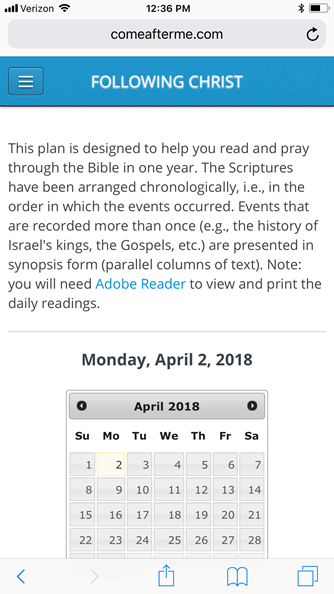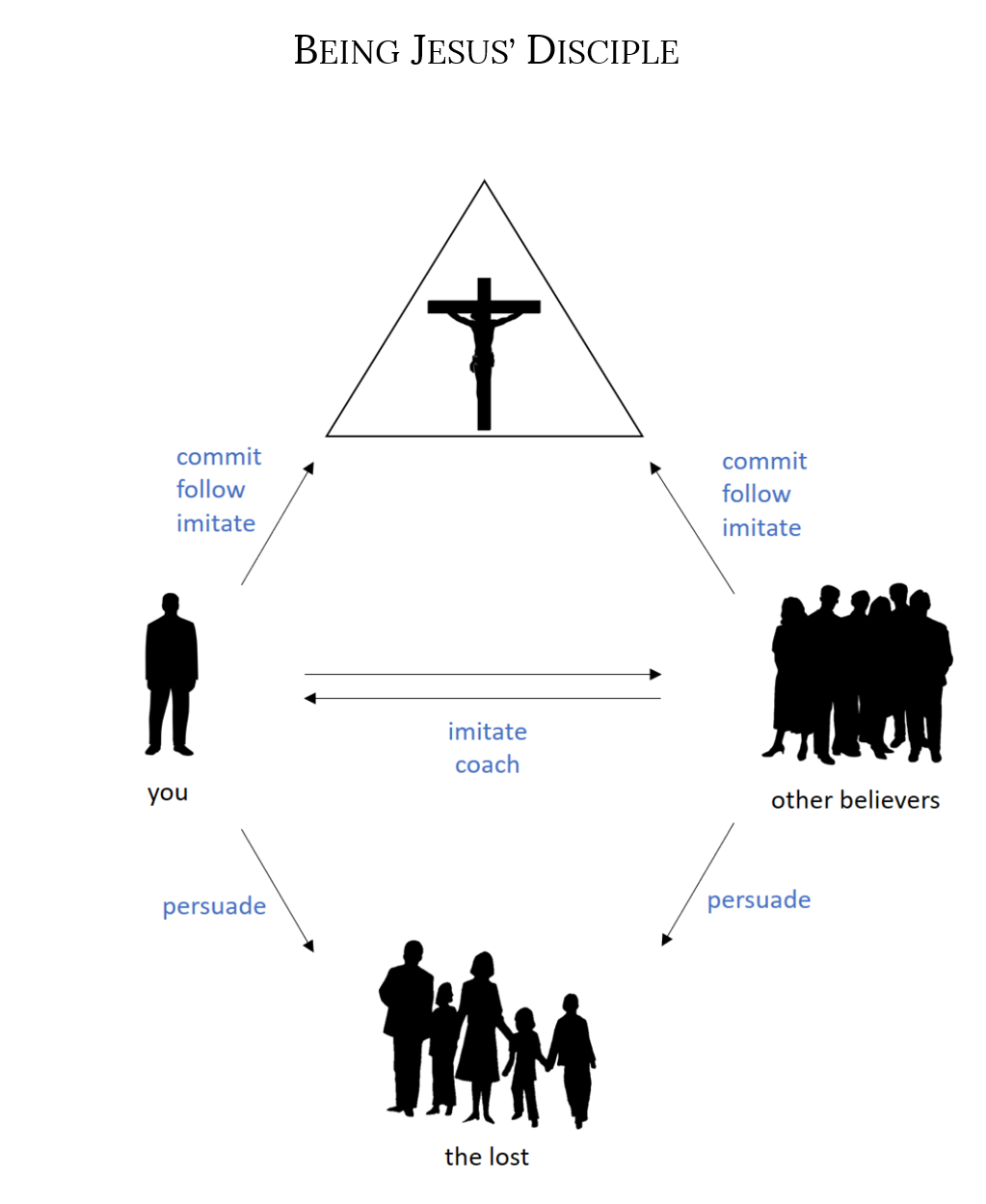Go and Make Disciples
Part Two: I Follow Jesus
▼ Teacher’s Guide & Study Questions
▼ Lesson Video
|
|
▼ Lesson Audio
|
|
| Then Jesus came to them and said, “All authority in heaven and on earth has been given to me. Therefore go and make disciples of all nations, baptizing them in the name of the Father and of the Son and of the Holy Spirit, and teaching them to obey everything I have commanded you. And surely I am with you always, to the very end of the age.” (Matt 28:18–20 NIV). |
1) How do I personally follow Christ?
A) |
Commit — resolving each day to be a disciple. |
1) |
Cultivate your identity. If someone asked you about your spirituality, what would you say? Most of us would probably respond with, “I’m a Christian,” and, of course, the disciples of Christ were indeed called Christians (Acts 11:26). Yet the word “Christian” has become a loaded word in our culture. It can mean different things to different people. I encourage you to think of yourself, and describe yourself to others like this: “I’m a disciple, a follower of Jesus.” The more you come to think of yourself in these terms, the more your heart and mind will resonate with this truth, and the more often you will ask, “How can I become more like Jesus?” |
2) |
Commit daily. Jesus said, “If anyone would come after me, let him deny himself and take up his cross daily and follow me” (Luke 9:23). The key to discipleship is self-denial. We must die to ourselves daily (give up the right to have our own way), and we must obey the Spirit, even to the point of death. That’s the example Jesus left us, and we must follow in His steps (1 Pet 2:21). I suggest you add this prayer to your daily conversation with God: “Father, thank you for your grace, which gives me the desire and power to do your will. Today, I consecrate myself to you. Help me to resist temptation and to say ‘Yes’ to the Holy Spirit. Help me to live each moment under His influence.” |
3) |
Be accountable. We all need fellow believers to whom we can be accountable. We need to humble ourselves and confess our faults to them (Prov 28:13; James 5:16), and then ask them to enter into a commitment of accountability. We are not meant to live the Christian life apart from the help and encouragement of the church. That’s why accountability to other believers is so important (cf. Heb 3:12–14; 10:23–25; 1 Thess 5:11; Gal 6:1–2). |
B) |
Follow — fostering a relationship with Jesus. |
1) |
Take time. The essence of eternal life is to know the Father through the Son (John 17:3). When we repented of our sins and believed in Jesus as our Savior, we began a relationship with God. As we all know, relationships take time. If we don't take time for personal discipleship, it won't happen. Jesus left us an example—He regularly left His disciples, went off by Himself, and spent time alone with God (Matt 14:23; Mark 1:35; Luke 5:16). We need to do the same. We need to find a place each day where we can be alone with the Father. We should eliminate as many distractions as possible and focus our minds on God. |
2) |
Listen to God. Jesus said, “If you abide in my word, you are truly my disciples” (John 8:31). If we want to “abide in” (know and obey) Jesus’ word, we must soak ourselves in Scripture. I like the phrase, ‘listening to God,’ because it emphasizes that when we read the Bible, God is speaking directly to us (cf. 2 Tim 3:15–16; 1 Cor 9:9–10; 10:11; Rom 4:23–24; 15:4; John 1:45; 5:39; Luke 24:25–27; Gal 5:14). Most of us think of reading as a solitary activity, but when we read God’s Word, we have just entered into a conversation with our heavenly Father! |
a) |
How much of what God has said should we be interesting in hearing? Suppose I told you that Paul’s letter to the church in Laodicea had been discovered in a dig in Turkey, and I said to you, “They divided the letter into ten chapters. How many chapters would you like to read?” All of them, of course! Do you have that attitude toward the entire Bible? We need to have our minds regularly exposed to all of God’s word. This ensures that we: |
|
b) |
In what order should we read the books of the Bible? I suggest that reading the Bible in chronological order is an excellent way to maximize your learning experience. |
|
c) |
How can we read the Bible in chronological order? I’ve personally tried several different chronological reading plans, and I also created one of my own. You can use it by clicking the “Bible” menu on the website. The plan is designed to take you through the Bible in a year, and you can read the Bible in several different versions (NASB, KJV, LEB, and NET). If you enjoy listening to the Bible, you can have it read to you in the English Standard Version (ESV), courtesy of esvbible.org. The availability of this plan on the internet facilitates groups of people reading the same passage of Scripture each day. |

3) |
Talk to God. All of us have struggled with what to say to God when we pray, and I’m sure we’ve all thought, “It would be so much easier to pray if God would just speak to me.” Well, the good news is…He has! As I said earlier, when we read the Bible, God is speaking directly to us (cf. Heb 12:5a). All we have to do is respond to what He has said. Think about what this means for prayer: (1) It means we don’t have to think up something to pray about each day. We can simply talk to God about what He just said. (2) It means we can have a conversation with our heavenly Father. He loves to talk to us and then hear what we’ve learned from His Word. (3) It means prayer can become more than just bringing a list of names and concerns to God. Prayer can be the most uplifting and exciting part of our daily walk with Christ! |
a) |
How do we pray about what we just read? This can be difficult to do at first, and so I've written a prayer for each day of the Bible reading plan. The prayers are designed to help you praise God, learn lessons from His Word, reflect on how Scripture applies to your life, ask God for grace and strength to live for Him throughout the day, and thank God for all that He’s done for you. You can pray these prayers as your own, or you can print out the “Daily Prayer Template” and write your own prayers. The goal is for your Bible reading and prayer time to be a conversation with God that challenges you and enriches your life. |
C) |
Imitate — following the example of Jesus and others. |
1) |
Imitate Christ. If we look at the highlights of Jesus’ life, several things stand out that are worthy of imitation: |
|
2) |
Imitate the godly. We are called to imitate “those who through faith and patience inherit the promises” (Heb 6:12). Here are a few examples: |
|
3) |
Invest in a local church. If you’re going to imitate the godly, you need to be with the godly! I have an entire lesson on this called “Participating in Church.” In that lesson, I say: “Everyone who is born again is given a spiritual gift by the Holy Spirit (Eph 4:7; 1 Cor 12:7). You are commanded to use your gift to help the body of Christ grow and flourish (1 Pet 4:10; Eph 4:15–16). It’s important for you to understand that you go to church to give as well as receive.” |
D) |
Coach — showing others how to be disciples. |
1) |
Informal coaching. All of us are coaching others all the time. How so? By living an example that others can follow. That is coaching! Every time you ask someone how they’re doing spiritually, you’re coaching. Every time you testify and joyfully worship God in church, you’re coaching. Every time you speak a kind word, you’re coaching. Every time you encourage another believer, you’re coaching. Every time someone sees you reading the Bible or praying or singing a hymn or reading a spiritual book, you’re coaching. Every time someone sees you serve others, give sacrificially, apologize for a wrong, be teachable when rebuked, be gracious when scorned, you’re coaching. |
2) |
Intentional coaching. While the example we live in front of others is essential, all of us are commanded to do intentional coaching. God told Israel to teach their children His laws, explain His commands, tell them about His works, and instill His ways in their hearts (Deut 4:9; 6:7; Exod 12:24–27). Jesus echoed this command when He told us to “make disciples…teaching them to observe all that I have commanded you” (Matt 28:18–20). We must take time and diligently, deliberately, intentionally coach others in how to be disciples of Christ. How do we do this? We invest, explain, show, and exhort. I’ll give you a template to follow and the tools to implement it later on in this series. |
E) |
Persuade — calling others to repentance and faith in Christ. |
1) |
Share the gospel. Like Paul, we should be looking for opportunities to tell others about Christ. One of the best ways to do this is by sharing our testimony—the story of how we became a disciple of Jesus. The lesson titled “Witnessing” has much more on how to do this. |
2) |
Live the gospel. It's easy to say that we’re disciples of Jesus, but it's hard to actually live a consistent, holy life. The greatest witness we can have to the truth of God’s transforming power is to live a transformed life in front of others. |
